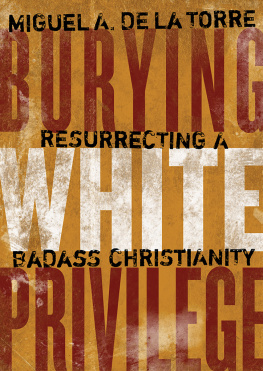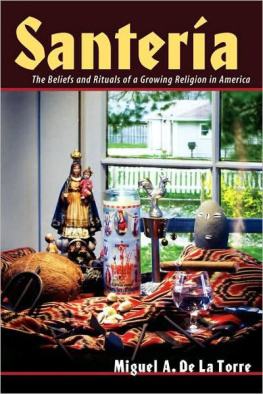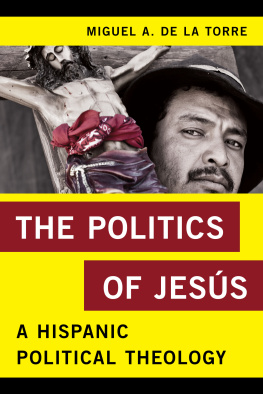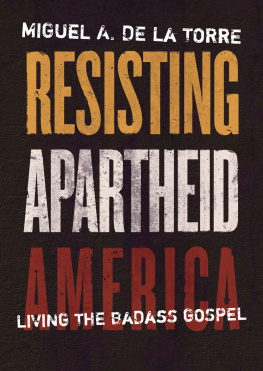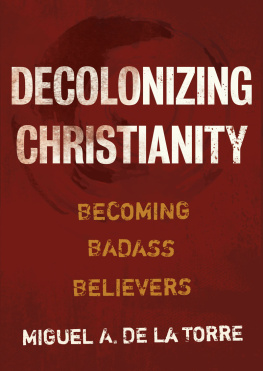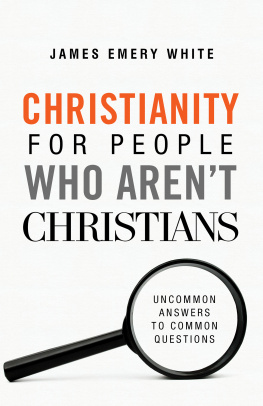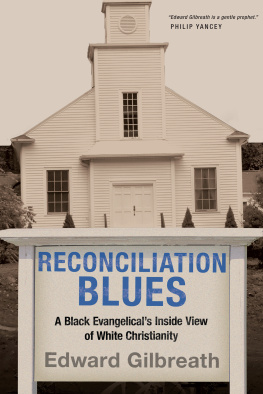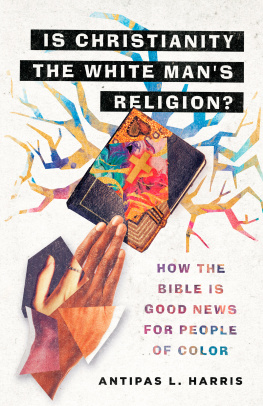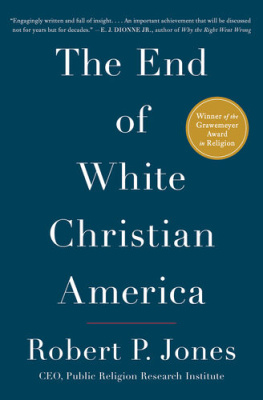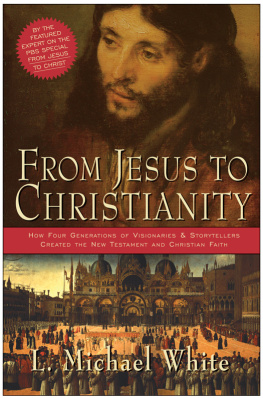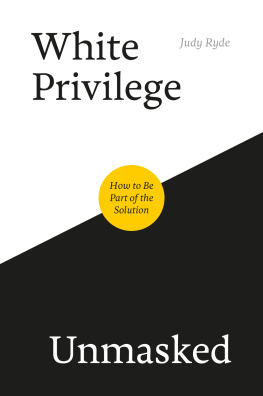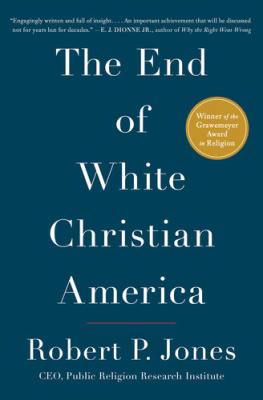BURYING WHITE PRIVILEGE
Resurrecting a Badass Christianity
Miguel A. De La Torre
WILLIAM B. EERDMANS PUBLISHING COMPANY
GRAND RAPIDS, MICHIGAN
Wm. B. Eerdmans Publishing Co.
4035 Park East Court SE, Grand Rapids, Michigan 49546
www.eerdmans.com
2019 Miguel A. De La Torre
All rights reserved
Published 2019
2827262524232221201912345678910
ISBN978-0-8028-7688-1
eISBN978-1-4674-5325-7
Library of Congress Cataloging-in-Publication Data
A catalog record for this book is available from the Library of Congress
To my alma mater
Southern Baptist Theological Seminary
Contents





Those of us who write seldom realize the influence, if any, our words might have upon the lives of others. Will our words be celebrated or condemned? Will our writing contribute to the discourse or have a negative impact? At times, I write something that I think is brilliant, only to have it be ignored. At other times, I write what I think will fall flat, only to see it go viral. This is what occurred with a short opinion piece that was published on November 13, 2017, on the Baptist News Global website. Frankly, I did not consider the op-ed to be one of my better works; nevertheless, it seemed to have hit a nerve. The Death of Christianity in the US was shared on social media over 416,000 times. Millions read and commented on the 759-word essay. I was truly taken aback. Ironically, I wrote this particular opinion piece six months earlier and placed it in a file to be quickly forgotten, only to rediscover the piece in November and submit it then for publication.
During an academic conference that same month, Trevor Thompson, acquisitions editor at Wm. B. Eerdmans Publishing Company, approached me and asked if I would consider turning this short piece into a book. I found the proposition intriguing. If I took on this project, my hope was to channel the literary style of my intellectual mentor: the nineteenth-century revolutionary, Jos Mart. I did not necessarily want to write another academic tome but instead wanted my words to appear as if they were coming from the heartfor they were. If I were to undertake this project, I wanted to engage in a difficult conversation based on my pain, my disillusions, and my hopelessnessa prevailing mood I detect within our society, especially among communities of color. My hope was to disengage the filters and be as real as possible.
Once I decided to write the book, I went to straight to work, placing other pressing projects on hold. It took me thirty-two days (a record for me), writing day and night, to finish the manuscript that you now hold as a book in your hands. Unlike my previous publications, this book exposes my soul and heart to the reader, hence opening myself to become more vulnerable. I have no doubt some might be tempted to demonize me for what I wrote; but I ask, please read my words with an open mind and heart. You need not agree with me, but please listen to how I, and many others who are disenfranchised, feel. I share these painful truths in the hope Christians might discover their own salvation and society might move toward a real rather than illusionary reconciliation. Liberation begins when the marginalized define themselves and their social location. For sixty years, I had been so accustomed to seeing through Eurocentric eyes that it had become second nature. This book represents the therapeutic process of decolonizing my mind, a process of moving away from how I have been taught to see myself, my community, and the overall social order.
Upon finishing the book, I shared the manuscript with my beloved and my children, who provided useful critiques and insights. To them I am grateful not just for their contributions to this work but for all they have contributed to my life and my worldview. I am also grateful to my editor, Trevor, for suggesting the idea for the book, offering me a contract to write, and for providing his many suggestions during the writing and editorial process. His encouragement and support were, and continue to be, greatly appreciated. And finally, I am grateful to you, the reader. I celebrate your courage and patience, especially if you are white, for attempting to see reality through the eyes of those who reside on societys underside. Such a practice needs to be recognized and encouraged. Let us together hope and pray that the humble words found on these pages might lead us all to a deeper and more profound conversation for the good of all our people and our nation.
Contrary to stereotypes, millennials and Generation Z are neither self-absorbed nor indifferent to the suffering of the world. These generations, generally speaking, abhor hypocrisy and have a deep grasp of right and wrong. The younger generations express genuine concern for the ever-increasing degradation of the environment and the worsening economy, which prevents so many from becoming self-sufficient adults. Meanwhile, far too many baby boomers sit idly by, ready to offer only their critiques. Our nations churches could bring forth a powerful word for such a time as this but have instead become convalescent congregations comprised of rapidly shrinking numbers of communicants representing the upper echelons of United States demographics. Not surprisingly, churches have become bastions of indifference and fortresses of the noncommittal.
Lacking vision, churches perish. Millennials are abandoning the church in droves, not because they lack spirituality
The death of Christianity within the United States has been a slow process, and it may very well be in its final throes. So I say, let the dead bury their dead.
This next generation, which will soon be inheriting the power structures of the United States, recognizes that the barbarians are not at the gate. The barbarians are and always have been the gatekeepers. The next generation gets it! And while some millennials and those of Generation Z can find common ground with the good news, they are turned off by money-grubbing clergy who stand in solidarity with silence and are too fearful of offending the wealthy, older, tithing congregants responsible for their compensation. In the graveyard where Eurocentric doctrines have gone to perish, and where churches act as catacombs and seminaries become cemeteries, cathedrals stand as ossuaries holding the remains of a former religious glory. Yesterdays glory is todays tourist destination. Whitewashed tombs may appear gentle on the eye, but they are full of the rotting bones of white theologies, where the stench of all manner of unclean Eurocentric religious theological propositions designed to exclude the spiritual contributions of the worlds colonized offend the nostrils, choking and suffocating those seeking life. These sacred crypts reek with the decay of Eurocentric Christianity, captured by demagogues, and bring forth a foul odor of faith laced with fear and hatred, hoping to procure and secure votes from those whose ears are tickled by patriotic rhetoric. It is worth repeating: such a Christianitythe Christianity of so many Euro-Americansis dying. Let the dead bury their dead!
Who Is Killing Christianity?
The gospel is slowly dying in the hands of so-called Christians, with evangelicals supplying the morphine drip. Christs message of love, peace, and liberation, has been distorted and disfigured by Trumpish flimflammers who made a Faustian bargain for the sake of expediency, whose licentious desire for ultraconservative Supreme Court justices trumped Gods call to judge justly. These Euro-American Christians have made a preferential option for the golden calf over and against the Golden Rule as they revel in an unadulterated power grab, deeming white privilege to be more attractive than waiting for the inheritance promised to the meek. White Christianity has more than a simple PR problem; it is inherently problematic.

